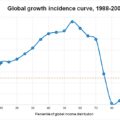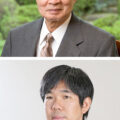Japan’s Diplomacy in 2022: Harmonization with like-minded countries is essential for economic security
Hayashi Yoshimasa (Foreign Minister of Japan) and Tanaka Akihiko (President of GRIPS)
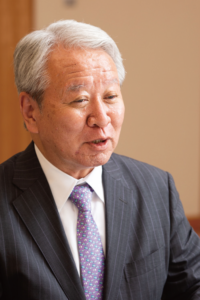 GRIPS President Tanaka Akihiko |
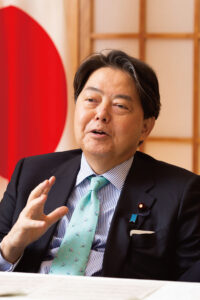 Foreign Minister Hayashi Yoshimasa |
| Photos: Watanabe Shigeki |
(Discuss Japan note: This interview was held on December 23, 2021 and the transcript was finalized on January 18, 2022)
Tanaka Akihiko: Two months have passed since you assumed the post of foreign minister. Seeing that you have held many ministerial portfolios in the past, what are your impressions?
Hayashi Yoshimasa: I anticipated it to some degree, but it has been extremely busy. The Ministry of Foreign Affairs (MOFA) deals with various domestic policies at the meta level, so to speak, and implements them externally. There are also many partners and multilateral frameworks. It is different from other ministries and government offices in the sense that you have to some degree apply a meta-perspective to the work since there is no end to the fine detail. The proportion of climate change and other cross-functional interactions that span existing global and policy fields, referred to as global issues at MOFA, is far higher than I imagined. That is my experience so far.
Tanaka: Your first overseas trip as foreign minister was in December 2021 when you attended the G7 Foreign and Development Ministers Meeting. I understand you played the piano and enjoyed yourself at the dinner party (laughs).
Hayashi: In addition to the G7 meetings, I was able to have many bilateral meetings and to build personal relationships with counterparts in like-minded countries while having frank discussions about issues in the international community.
About the dinner party … (laughs). I have been a big fan of the Beatles since junior high school and I had wanted to visit Liverpool once in my life, but it happened unexpectedly. The venue was at the Beatles Story museum where in a room at the very back of the museum they had built a mock-up of the Cavern Club, which is the live house where the Beatles often performed. Going there, you pass displays of many valuable items including a pair of John Lennon’s round glasses. In one corner of the room, there was a replica of the white piano that John used to played Imagine. We all gathered together for a commemorative photograph when someone said “Yogi (Hayashi’s nickname from the US cartoon Yogi Bear), why don’t you sit at the piano?” I asked the museum attendant if I could play, screwed up my courage and played a bit from Imagine.
Tanaka: As foreign minister, I suppose you need to perform in many ways, don’t you.

On December 11, 2021, Foreign Minister Hayashi attended the G7 Foreign and Development Ministers Meeting held in Liverpool. On a visit to the Beatles Story museum for a dinner party, he gave an impromptu rendering of John Lennon’s Imagine on the piano, and was applauded by the foreign ministers from all countries.
Photo: Pool via REUTERS/AFLO
Launching Hayashi diplomacy
Tanaka: The level of tension in US-China relations have increased with the inauguration of the Biden administration in 2021 and efforts by the Xi Jinping administration in China to consolidate its power base. How do you perceive the international situation around Japan?
Hayashi: The circumstances are changing in ways that are extremely fast-moving and run deep, and I strongly feel that we are in a time of epoch-making change. For example, in the past several years, a number of challenges have surfaced with regard to values that we have considered a matter of course, such as the universal values of democracy and the rule of law, and the existing international order that is based on these values. Lately, economic security has also focused minds as various elements that were previously perceived as economic categories now control security. Amid such major changes, Japanese diplomacy will be required to redouble efforts, based on the Japan-US alliance, to realize the Free and Open Indo-Pacific (FOIP).
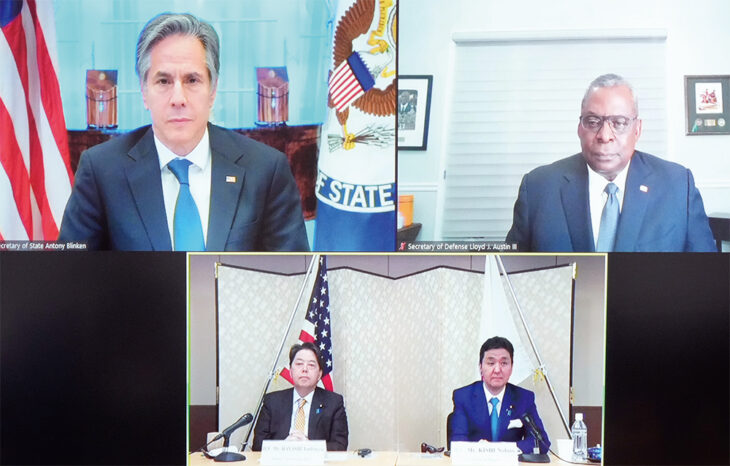
Virtual meeting of the Japan-US Security Consultative Committee (Japan-US 2+2) on January 7. From top left, Secretary of State Antony Blinken and Secretary of Defense Lloyd Austin. From bottom left, Foreign Minister Hayashi Yoshimasa and Minister of Defense Kishi Nobuo. The meeting agreed to continue to advance the capabilities of the Japan-US Alliance and participation in the Free and Open Indo-Pacific.
Photo: Ministry of Foreign Affairs
Tanaka: No other initiative set out as Japan’s diplomatic vision has gained as much longstanding appreciation and sympathy from other countries around the world as the FOIP. With levels of tension on the rise in recent years, I think a fair amount has been achieved in an unpredictable international community, but how will this be followed up?
Hayashi: As you point out, it is a rare occurrence in diplomacy for a phrase originating in Japan to enter the international discourse to the extent that the Free and Open Indo-Pacific has done. The term “Abenomics” also gained widespread attention worldwide though assessments of the policy varied, as the Abe Cabinet was good at communications.
Of course, the Kishida Cabinet is following up with the FOIP. Based on the confidence in Japan built up by the Abe and Suga administrations, the Kishida Cabinet is advocating and continuing to develop the Three Determinations. That is, the determination to fully defend universal values, the determination to fully safeguard the peace and stability of Japan, and the determination to contribute to humankind and take on a leadership role in the international community. In addition, I believe it is important to open a new frontier of Japanese diplomacy with a balanced and stable posture with high level of readiness.
Japan-China relations: A resolute response to territorial and human rights
Tanaka: The difficult part of Japanese diplomacy that needs to be handled is the Japan-China relationship. Chinese cooperation is necessary to realize the FOIP. To put it differently, we need to ask China to exercise self-restraint and to take responsible action, but what exactly is the plan?
Hayashi: China is a neighbor and, therefore, there are a number of issues between our two countries. To some extent, this in itself is the reality that we must come to grips with. Additionally, the rapid expansion of military power and the lack of transparency, the unilateral attempts to change the status quo in the East and South China Sea, including the waters surrounding the Senkaku Islands, and the expansion of China’s military activities are strong security concerns for the region, including Japan, and the international community.
Of course, economic factors are important when building a constructive and stable [Japan-China] relationship. There are significant economic exchanges between us including trade and investment. What is important, however, is that we must not compromise on the concerns I mentioned earlier, particularly with regard to sovereignty and territory, including the Senkaku Islands, as well as fundamental values such as democracy and human rights, while firmly promoting economic exchanges.
Tanaka: On December 4, 2021, China published a white paper titled China: Democracy That Works, which advocates the legitimacy and validity of Chinese-style democracy. However, if China calls itself “democracy,” Japan needs to firmly demand from China to practice the rule of law and human rights.
Hayashi: That is correct. The Prime Minister has already stated that we will firmly maintain and assert our position, and above all, since China has now become such a large country, demand responsibility as a great power from China. In that sense, we need to continue dialogue and cooperate where we can.
At the telephone talk which I held with State Councilor Wang Yi last November, I explicitly expressed concerns about the serious situation of human rights in Hong Kong and the Xinjiang Uygur Autonomous Region. Again, Japan-China relations are important, but it does not mean that we hold our tongue about things China does not like. It is important to firmly maintain and assert our position. This is how we build a “constructive and stable relationship” with China.
Tanaka: In the past, there was more diversity of opinion among government officials and in the party in China. In recent years, it appears that rigidity is setting in as power continues to converge on the Xi Jinping administration.
Hayashi: When I visited China with a delegation of Diet members in the early 2000s, one of us asked a party official in a province how long China would continue with the one-party dictatorship. His answer was, “Income disparity in China is extremely large. I think we will need this system until income disparity is contained within a certain range.” I remember well this official’s forthright response based on the Western macroeconomic logic. I have also had some fairly frank discussions on diplomacy with other individuals. However, as they are promoted and appointed to higher positions within the party, they tend to gradually follow the fixed response procedure and become more and more by-the-book.
Can we leverage 50 years of the normalization of diplomatic relations?
Tanaka: In 2022, we mark the 50th anniversary of the normalization of diplomatic relations between Japan and China. Will this create momentum for a constructive and stable [Japan-China] relationship?
Hayashi: It will certainly be a critical juncture, but in addition to the issues that I have already mentioned, I feel that we are very much constrained by the rise of COVID-19 infections with the recent Omicron strain. In this context, I think the main focus of the 50th anniversary will be on diverse personal and cultural exchanges centered on the private sector.
Tanaka: As you have pointed out, there is competition and friction between Japan and China, but since we are neighbors, it is essential to promote understanding and trust between the nations at different levels, as well as dense personal exchanges to avoid any unnecessary confrontation. Amid the focus on economic security and technology leakage some exchanges will, of course, require attention. Keeping this in mind, I have the impression you would like to emphasize the significance of proactive personal exchanges.
Hayashi: Personal exchanges are indeed important.
Cooperation with like-minded countries who are essential to economic security
Tanaka: I would like to ask you about national security. In his policy speech in December 2021, Prime Minister Kishida Fumio stated that a new National Security Strategy (NSS), National Defense Program Guidelines, and Mid-Term Defense Program will be formulated over the course of roughly one year. Surely, economic security is a high-profile element in the NSS. Which points do you think are important?
Hayashi: Before economic security was on everybody’s lips and about two years ahead of where we are today, the Strategic Headquarters on the Creation of a New International Order, Policy Research Council of the Liberal Democratic Party (LDP), chaired by Amari Akira, convened as often as twice a week at its busiest to discuss economic security. I have served as Vice Chair, and the members included Yamagiwa Daishiro (currently the Minister of State for Special Missions [Minister in Charge of Economic Revitalization]) and Tokai Kisaburo. Kobayashi Takayuki, First Minister in charge of Economic Security, headed up the Secretariat.
In May 2021, the discussions were published in the form of the Interim Report: Basic Policy for Economic and Fiscal Management and Structural Reform 2021. I think the key is to think of economic security as hinging on strategic autonomy and strategic indispensability. As symbolized by the shortage of masks during COVID-19, strategic autonomy is the ability to obtain what you need when something happens. Broadly speaking, it also includes foodstuffs. Strategic indispensability is a situation where Japan possesses advanced technologies to the point where other countries prioritize rather than ignore relations with Japan. We are now at a stage where the Kishida Cabinet has appointed a Minister in Charge of Economic Security and submitted a draft bill to the ordinary Diet session.
Tanaka: What are the points where MOFA focuses its efforts?
Hayashi: In terms of jurisdiction, it is the role of MOFA to take the lead on how to shape international rules from the perspective of responsibility for security and international law. It makes no sense for Japan to advocate standards and rules on its own; rather, it is important to formulate rules that are to some degree harmonized with our ally the United States, like-minded countries in Europe, and the Quad (Japan, Australia, India, US).
Based on the LDP Interim Report I mentioned a moment ago, the focus is on creating resilient supply chains and ensuring the security and reliability of critical infrastructure to establish strategic autonomy. Strategic indispensability includes aspects such as promoting public-private sector cooperation with regard to sophisticated and important technologies, and non-disclosure of patents. The legal preparations are already underway, but MOFA must also resolutely fulfill its responsibilities.
Tanaka: On the point of strategic indispensability, Japan should work hard. On the other hand, in terms of strategic autonomy, Japan should avoid a narrow-minded thinking such as “self-sufficiency in all strategic supplies.” As you have already stated, providing leadership on realistic directions, such as building supply chains for strategic supplies among friendly nations that share the same values, is an important role for MOFA.
Hayashi: Yes. Harmonization applies not only to rules, but also to supply chains and data free flow [with trust]. Our own efforts and self-help are important to start with, but of course, we also need to cooperate.
I was Minister of Agriculture, Forestry and Fisheries when we concluded the Japan-Australia Economic Partnership Agreement (EPA), and in the Agreement, we introduced a provision endeavor not to introduce or maintain export controls, even in the event where the production of essential food falls short in the exporting country. I believe the provision was a first for an EPA signed by Japan. This example relates to foodstuffs, but specific industries and commodities also have similar aspects. I think that diverse efforts would be required to like-minded countries.
Tanaka: Even though it goes without saying that the Japan-US Alliance is the cornerstone of Japanese diplomacy, this is a time of high expectations for a broader scope for diplomacy than in the past with the emergence of the Quad, and the AUKUS (United States, United Kingdom, Australia), which does not include Japan, as the framework for friendly nations and countries that share the same values. There is also increasing interest in the Indo-Pacific order from the European countries.
Hayashi: The Japan-US Alliance is strong, but as you point out, it is important to share Japan’s interests and concerns with other like-minded countries with the same universal values. Personally, I have had exchanges with EU parliamentarians for about ten years now. In the course of these discussions, I had an aha moment when I heard someone say, “European countries have security concerns with regard to Russia, but they recognize the economic opportunities of the huge Chinese market. Japan is concerned about China, but explores economic potential with Russia. We have these mirror images of China and Russia but we need to have them join up.”
Recently, Europe has also come to increasingly view China as a threat from the aspect of security guarantees, and I believe Japan has played a major role in this. At the recent G7 meeting in Liverpool, China was the first topic for discussion, and after the chairperson got the ball rolling, the discussion started with a statement from me. The meeting spent a lot of time sharing concerns about China. I think it was symbolic in that sense.
Timing is everything in human rights and democracy diplomacy
Tanaka: A short while ago, you mentioned the democracy issue in Hong Kong and the human rights issue in the Xinjiang Uygur Autonomous Region, but looking at the wider world, there are many instances of respect for human rights and the establishment of democracy as pictured by Japan and the West moving backward, including the military coup in Myanmar, the US army withdrawal from Afghanistan and the Taliban takeover, as well as the tense situation in Ethiopia. These are important countries for Japan and countries where we have been deeply engaged in the past. In this situation, what approaches do you think Japan should take to improve the human rights situation and to restore democracy?
Hayashi: In December 2021, the Summit for Democracy was convened online at the invitation of the United States. Thirty years after the end of the Cold War, the Summit set out a message of holding fast to the fundamental values of liberal democracy and human rights.
Immediately after the end of the Cold War, there was a sense of euphoria—the age of ideological conflict had come to an end and liberal democracy would spread worldwide. This was the argument made by Francis Y. Fukuyama in The End of History and the Last Man. However, the reality has turned out different, and in recent years we have seen quite a few examples of the reverse. There are various factors at play, but one of them is probably the advance of digitalization. In the global economy, we also have the disparity between rich and poor, which is growing both within nations and between nations, and I think we can also say that the role of the state is expanding to assume responsibility for macroeconomic coordination.
Whether internally or between nations, it is never a good idea to put the human rights issue on ice until such disparities have been eliminated. Human rights as a universal value that the state is duty bound to protect is an approach that Japan has long shared with the West. As I said just now, to advance this way of thinking, it is important to say what must be said in addition to supporting voluntary initiatives in each country. As suggested by the phrase “timing is everything,” to identify the right time for action is not only a matter of applying external pressure, but we must also encourage voluntary initiatives in each country through, for example, bilateral dialog and cooperation. Looking back on Japan’s postwar path to democracy, I believe this is what is necessary.
Tanaka: In your capacity as someone who has promoted parliamentary diplomacy and cultivated personal connections and friendships in Europe, the United States, and Asia, we have high expectations of your abilities in this area. The work of the foreign minister is difficult amid the ongoing COVID-19 pandemic, but we wish you the best of success.
Translated from “2022 nen no Nihon gaiko wo tenbosuru: Keizai-anzenhosho ni fukaketsuna doshikoku tono hamonaizeishon (Japan’s Diplomacy in 2022: Harmonization with like-minded countries is essential for economic security),” Vol. 71 Jan./Feb. 2021, pp. 6-14. (Courtesy of Toshi Shuppan) [March 2022]
Keywords
- Hayashi Yoshimasa
- Foreign Minister of Japan
- Ministry of Foreign Affairs
- MOFA
- Kishida Cabinet
- Akihiko Tanaka
- National Graduate Institute for Policy Studies
- GRIPS
- G7
- The Beatles
- Imagine
- Japan-US alliance
- Japan-China
- Free and Open Indo-Pacific
- FOIP
- Three Determinations
- human rights
- economic security
- liberal democracy


